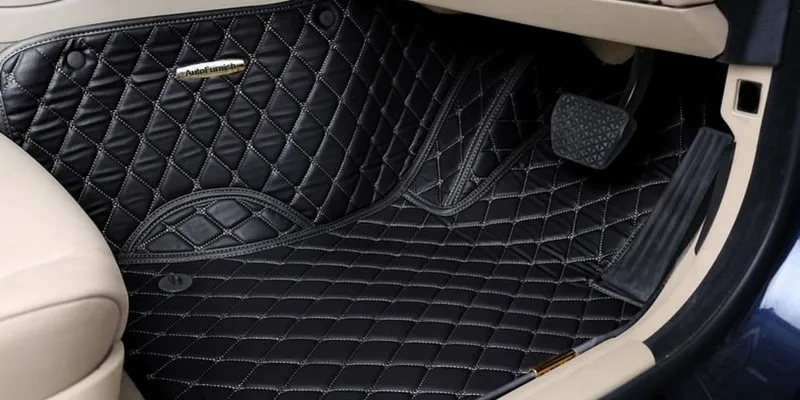With Rs 28 Cr turnover, this Delhi-based auto accessories company is riding high on auto slowdown
Started in 2012, Delhi-based AutoFurnish is an auto accessories manufacturing and ecommerce business. It claims to be going strong despite the auto slowdown. Here's how.

AutoFurnish founders Chakit Khattar (left), Rupal Wadhwa (middle), and Puneet Arora (right)
In every adversity there lies the seed of an equivalent advantage, wrote Robert Collier, an American author of self-help.
Putting Collier’s words into practice is New Delhi-based auto accessories manufacturing company AutoFurnish.
Started by Puneet Arora, Rupal Wadhwa, and Chakit Khattar in 2012, AutoFurnish, which is an auto accessories manufacturing and ecommerce business, is seeing increasing demand for auto accessories despite India’s auto slowdown, and gets over 2000 daily orders for its products.
AutoFurnish is making the most of a declining industry, which recorded its worst-ever sales in two decades in 2019.
But how? The answer is simpler than one might think - AutoFurnish has a strong focus on selling to the pre-owned vehicles segment.
The Delhi-based company, which has a manufacturing unit in Malviya Nagar, claims it has a turnover of Rs 28 crore.
Unaffected by slowdown
The auto slowdown in India saw an overall sale of vehicles across categories decline 13.77 percent between 2018 and 2019. However, it does not account for the sales of pre-owned vehicles. The pre-owned vehicle market has remained largely unaffected by the auto slowdown.
In fact, increasing levels of formalisation and consolidation in the pre-owned car market have seen the segment grow significantly in the last few years.
“The ongoing recession surprisingly doesn’t have any kind of impact on the auto accessories sector. The entire credit goes to the rise of the second-hand car market,” says Puneet Arora, Founder and CEO, AutoFurnish.
He adds: “In a broader perspective, the pre-owned car market is one of the major factors behind the declining sales of new cars and the growth of the car accessories market.”

Puneet Arora, Founder and CEO, AutoFurnish
AutoFurnish targets customers who are looking to save money by purchasing pre-owned cars, and want to refurbish them by buying accessories.
“The car accessories market in India has come a long way in the last couple of years. A lot of innovation is happening in the car accessories market. To meet the demands of pre-owned car buyers and giving them all premium features, auto accessories manufacturers are leaving no stone unturned in bringing new technology and innovation to match the features of new cars,” the 39-year-old says.
He attributes this as the reason why the auto accessories market is moving at a consistent pace, and is not showing signs of slowdown.
How the idea was born
Puneet, who has an IT background, says he was inspired to become an entrepreneur during his time at IIM Bangalore. In 2012, he met Rupal, whose family was in the auto accessories business.
Puneet and Rupal realised the Indian auto accessories market was fairly unorganised, and there were no large and well-established brands.
“There was potential to create a brand so customers could choose to buy a branded product for their vehicles. We saw small and offline car accessories markets in Tier II and Tier III towns did not have a good range of products or brands. This spelled an opportunity for us,” Puneet says.
The duo began looking at how to capitalise on this finding. Puneet felt online digital marketing of auto accessories would be the most obvious and successful channel. But the idea received criticism. When the founders floated the idea to their friends, families, and local auto accessories dealers, they found that not many people accepted the idea of buying auto accessories online.
However, this did not deter the founders. They saw it as an opportunity to capture markets that were fast becoming digitised. “This was the mindset of the market that we wanted to change, and found great potential in retailing auto accessories in Tier II and Tier III towns through online channels,” he says.

AutoFurnish's black mat car accessory
In the same year, Puneet and Rupal started AutoFurnish by investing their own money to build an ecommerce portal to sell auto accessories. They also listed the products on various online marketplaces.
“We decided to start as a self-funded company and grow through earning and reinvesting. It was a fusion of our technical and functional knowledge, and we achieved good sales numbers by 2014,” Puneet says.
Chakit joined the duo, and in 2015, the founders decided to start manufacturing the products themselves, with an aim to meet the rising demand for high quality auto accessories. But they could do this only if they had control over manufacturing.
To begin with, AutoFurnish started making car seat covers, foot mats, polishes, dusters, riding gear, bike suits, face masks, etc., at a manufacturing unit in Malviya Nagar. The company claims it went on to manufacture over 250 types of car accessories and over 100 types of bike accessories.
Focus on selling online
Puneet’s agenda was to simplify the process of buying car and bike accessories. Besides its own website, AutoFurnish’s new products were listed on Amazon India, Flipkart, and other online marketplaces.
“It was quite a daunting task for buyers to visit aftermarket accessories stores and visit multiple shops. We made it easy for them to get their hands on our range of exterior, interior, car care, and style accessories within a few clicks,” he says.
Today, AutoFurnish is both a manufacturing company as well as an ecommerce business, and this has allowed it to sell directly to consumers.
After manufacturing, AutoFurnish lists the products online - a process which eliminates the need for middlemen or intermediaries. This allows the business to sell at wholesale rates and pass on a significant cost advantage to its customers.
“Through this M2C (manufacturing-to-consumer) model, we can ensure our products are not only of high quality and durable, but also light on the customers’ pockets,” Puneet says, adding that 1,800 out of 2,000 daily orders come from online channels.

AutoFurnish's car body cover
Dealing with the large volume or orders is easier said than done. AutoFurnish faced challenges in managing supply to cater to the demand that was coming in. To overcome this, the company developed an ecommerce-centric ERP (Enterprise Resource Planning) system to help manage inventory.
The proprietary and copyrighted software now helps AutoFurnish control and monitor different stages of an order - right from procurement of raw material, manufacturing, and warehousing to product listing and payments.
Puneet claims AutoFurnish enjoys a first mover advantage in the auto accessories segment in India. He doesn’t identify competitors in the company’s drive to become a household name for auto accessories across Asia.
“We have plans to expand AutoFurnish’s online and offline footprints beyond our current boundaries. We plan to create offline distribution channels across south and southwest Asian countries and cover major automobile markets such as Bangladesh, Nepal, Sri Lanka, Myanmar, UAE, and Saudi Arabia by 2022,” he says.
(Edited by Megha Reddy)









